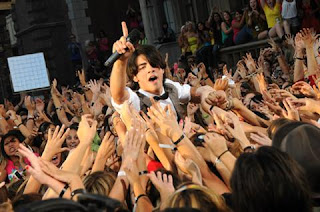
Most businesses use some form of impression management "to control the impression they present during the service encounter" as mentioned in Anne M. Velliquette and Jeff B. Murray's The New Tatoo Subculture. This is also true for educational institutions. Colleges across the world want perspective students to get the impression that they are looking at the academic setting that is best equiped to prepare them for the profession of their choice. For different countries the approach to doing this may look different. In the United States of America colleges range from liberal arts and technical to medical and Ivy League. The U.S. has lots of variety to meet the demands of a diverse people. In certain middle eastern counrties, colleges focus on math and science to appeal to the dominant amount of perspective students looking for careers in those areas. As a result, brochures are packed with academic focused information. Colleges paint themselves as intellectual places where one can obtain success in pursuing their profession. They are careful to make sure the perspective student is not openly shown the disadvantages and risk that go along with studying at an institution.
From my own experience, I have seen the College of Charleston the way the school wanted to portray itself to me as a perspective student and through being an actual student. Using impression management, the college showed me its endless number of majors, study abroad programs, beautiful campus, and three story library. While they did mention certain precautions the college mainly focus on being "my perfect fit" liberal arts college. The dining hall had a variety of stations to accommodate my my specific taste, while the library had many floors on which I could research, study, get my computer fixed, and even grab some coffee for late night studying. Not only did they have adequate modern facilities for learning for those that prefer that, but they also had historical house in which one can take a class or be advised in for those that appreciated historical sites. Most importantly they had a variety of majors taught by qualified professors. To appeal to my interesting in writing in English, they could offer me the option of taking a class with the published author of Jewel, Bret Lott. I was under the impression that this was my college heaven.
As a student, I got to see the elements of the college that were less dislayed to the "customer". One of the stigmas the college deals with is being a called a party school, which is something that I had no knowledge of being an out-of-state student. My impression of what partying was like was managed by a website pictures of a flash rave in the library--good clean fun. It wasn't until orientation that they started revealing how they deal with the large number of students abusing alcohol and administering alcohol education test. They also painted themselves as a well secured place with public security call boxes everywhere and security walking around. By doing this they down played the crime that I now get more information about now that I am a student. Just last semester I got about five security alert emails in one week.
Looking at the broader picture, this is something that colleges across America and the world deal with. While MIT is a well-known, prestigious technical school it doesn't tell its perspective students that it has a high suicide rate and other factors that can have an influence on the students academic life and well being (Matrix: The Magazine for Leaders in Education April 2001 by Al Branch). When adressing many of these issues euphemism is used to water the issue down to a norm, as seen with the way strippers describe themselves as exotic dancers and socially justify their occupation in Jacqueline Lewis' Learning to Strip. In this same way colleges use statements like, "that can happen at any school" when asked specific questions about a problem that they are dealing with. This is also seen in countries like Iraq where educational reforms are being made and education is being promoted, but emphasis isn't being put on the fact that there is the risk of schools being bombed.
In conclusion, controlling what others think is an informal norm used not only in the business world, but also the education world. The usage of this technique is popular because it is what society responds to. As Machiavelli conveyed in The Prince, the way to gain control over a group of people is by giving them what they want. In this case, educational institutes are doing just that, but kicking the dirt that comes along with the attachment under the rug. Because the average student wants the academic opportunity presented to them they tend to allow these institution to affectively use this technique and gain power over their perspectives. As a result, some don't obtain the diploma or career they intended because of mental break downs, sexual assult, addictions, and other temptations and vulnerabilies that come with studying at a university.
From my own experience, I have seen the College of Charleston the way the school wanted to portray itself to me as a perspective student and through being an actual student. Using impression management, the college showed me its endless number of majors, study abroad programs, beautiful campus, and three story library. While they did mention certain precautions the college mainly focus on being "my perfect fit" liberal arts college. The dining hall had a variety of stations to accommodate my my specific taste, while the library had many floors on which I could research, study, get my computer fixed, and even grab some coffee for late night studying. Not only did they have adequate modern facilities for learning for those that prefer that, but they also had historical house in which one can take a class or be advised in for those that appreciated historical sites. Most importantly they had a variety of majors taught by qualified professors. To appeal to my interesting in writing in English, they could offer me the option of taking a class with the published author of Jewel, Bret Lott. I was under the impression that this was my college heaven.
As a student, I got to see the elements of the college that were less dislayed to the "customer". One of the stigmas the college deals with is being a called a party school, which is something that I had no knowledge of being an out-of-state student. My impression of what partying was like was managed by a website pictures of a flash rave in the library--good clean fun. It wasn't until orientation that they started revealing how they deal with the large number of students abusing alcohol and administering alcohol education test. They also painted themselves as a well secured place with public security call boxes everywhere and security walking around. By doing this they down played the crime that I now get more information about now that I am a student. Just last semester I got about five security alert emails in one week.
Looking at the broader picture, this is something that colleges across America and the world deal with. While MIT is a well-known, prestigious technical school it doesn't tell its perspective students that it has a high suicide rate and other factors that can have an influence on the students academic life and well being (Matrix: The Magazine for Leaders in Education April 2001 by Al Branch). When adressing many of these issues euphemism is used to water the issue down to a norm, as seen with the way strippers describe themselves as exotic dancers and socially justify their occupation in Jacqueline Lewis' Learning to Strip. In this same way colleges use statements like, "that can happen at any school" when asked specific questions about a problem that they are dealing with. This is also seen in countries like Iraq where educational reforms are being made and education is being promoted, but emphasis isn't being put on the fact that there is the risk of schools being bombed.
In conclusion, controlling what others think is an informal norm used not only in the business world, but also the education world. The usage of this technique is popular because it is what society responds to. As Machiavelli conveyed in The Prince, the way to gain control over a group of people is by giving them what they want. In this case, educational institutes are doing just that, but kicking the dirt that comes along with the attachment under the rug. Because the average student wants the academic opportunity presented to them they tend to allow these institution to affectively use this technique and gain power over their perspectives. As a result, some don't obtain the diploma or career they intended because of mental break downs, sexual assult, addictions, and other temptations and vulnerabilies that come with studying at a university.

